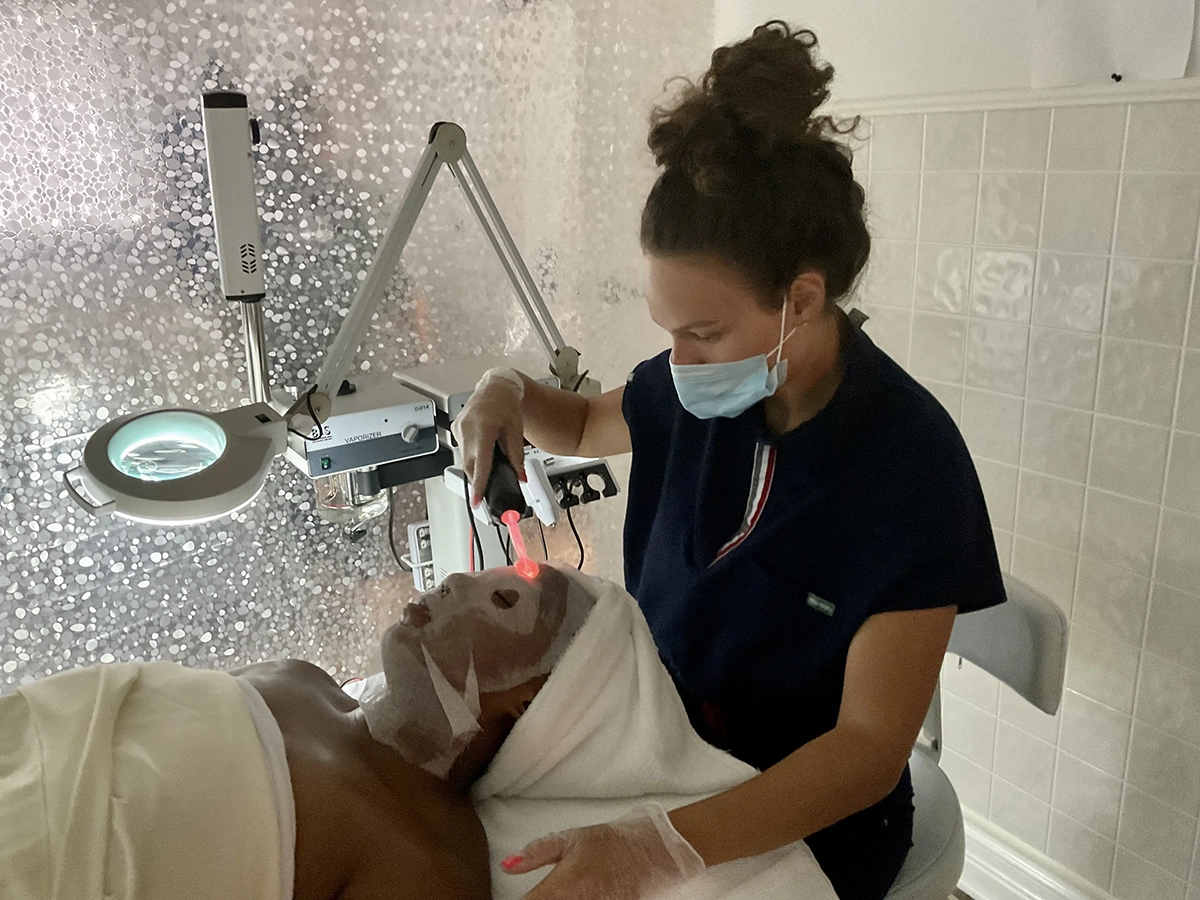How to Become an Esthetician: Unveil Your Path

To become an esthetician, you must complete a state-approved training program and obtain a license. This typically involves completing a certain number of training hours and passing a written and practical exam.
Estheticians are skincare professionals who specialize in providing treatments to improve the health and appearance of clients’ skin. These treatments can include facials, chemical peels, microdermabrasion, and waxing. To become an esthetician, you must first research the specific licensing requirements for your state.
Generally, you will need to complete a state-approved training program, which can range from a few hundred to over a thousand hours of instruction. Once you have completed your training, you will need to pass a written and practical exam to obtain your license. Many estheticians also pursue additional training and certifications to specialize in specific areas such as medical esthetics or makeup artistry.

Credit: m.youtube.com
Introduction To Esthetics
Esthetics is the practice of skincare and beauty treatments, and becoming an esthetician requires completing a state-approved training program and obtaining a license. Aspiring estheticians can enroll in a reputable esthetics school to gain the necessary knowledge and skills in skincare techniques, makeup application, and other related areas.
The Role Of An Esthetician
Esthetics is a rapidly growing industry that focuses on improving the appearance and health of a person’s skin. Estheticians are highly trained professionals who specialize in the maintenance and care of skin, providing a range of services that help clients feel and look their best. They work in various settings, including spas, salons, and medical offices, providing a wide range of services.
Estheticians provide services such as facials, waxing, chemical peels, microdermabrasion, and other treatments that help to improve the appearance of the skin. They also educate clients on proper skincare techniques, recommend products, and provide guidance on how to maintain healthy skin.
Benefits Of A Career In Esthetics
A career in esthetics can be very rewarding, providing you with a range of benefits that make it an excellent career choice. Some of the benefits of a career in esthetics include:
- Flexible work schedules
- Excellent earning potential
- Opportunities for career advancement
- Ability to work in a variety of settings
- Opportunities to work with a diverse group of people
- The satisfaction of helping clients look and feel their best
Overall, a career in esthetics can be an excellent choice for those who are passionate about skincare and want to make a difference in the lives of others. With the right training and experience, you can build a successful career in this exciting and growing field.
Educational Requirements
When it comes to pursuing a career as an esthetician, meeting the educational requirements is essential. Estheticians are skincare specialists who are trained to provide various treatments to improve the health and appearance of the skin. Here’s what you need to know about the educational requirements to become an esthetician.
Esthetician Programs And Courses
Esthetician programs and courses are designed to provide students with the knowledge and skills required to succeed in the field of skincare. These programs typically cover topics such as skincare techniques, facial treatments, makeup application, hair removal, and product knowledge. Students also learn about anatomy and physiology of the skin, sanitation and safety protocols, and client consultation. These programs often include practical training to give students hands-on experience.
Choosing The Right Esthetics School
Choosing the right esthetics school is crucial for obtaining a quality education. When selecting a school, consider factors such as accreditation, curriculum, facilities, and faculty qualifications. Look for schools that offer comprehensive programs and provide opportunities for practical training. Researching the reputation of the school and seeking feedback from alumni can help in making an informed decision.
Certification And Licensing
Becoming an esthetician requires obtaining the necessary certification and licensing. This process ensures that estheticians have the knowledge and skills needed to provide professional skincare services. In this blog post, we will explore the steps involved in obtaining certification and licensing as an esthetician.
State Licensing Requirements
Each state has its own specific requirements for estheticians to become licensed. It is important to research and understand the licensing requirements of the state in which you plan to practice. Generally, these requirements include completing an approved esthetician training program and passing a licensing exam.
Here are some common state licensing requirements:
- Completion of a state-approved esthetician training program
- Minimum age requirement (typically 16 or 18 years old)
- High school diploma or equivalent
- Submission of an application and fee
- Passing a background check
It is important to note that the specific requirements may vary from state to state, so it is crucial to check the regulations of the state you are interested in practicing as an esthetician.
Preparing For The Licensing Exam
Once you have met the state’s requirements, the next step is to prepare for the licensing exam. This exam evaluates your understanding of esthetics theory and practical skills. To increase your chances of success, consider the following tips:
- Review your esthetician training materials thoroughly
- Take practice exams to familiarize yourself with the format and types of questions
- Seek additional study resources, such as textbooks or online courses
- Practice your practical skills, such as performing facials and applying makeup
- Consider joining study groups or seeking guidance from experienced estheticians
By dedicating time to study and practice, you can feel more confident and prepared for the licensing exam.
Obtaining certification and licensing is a crucial step in becoming a professional esthetician. By understanding your state’s licensing requirements and adequately preparing for the licensing exam, you can embark on a rewarding career in the field of esthetics.
Specializations In Esthetics
Medical Esthetics
Medical esthetics involves advanced skincare treatments that are performed under the supervision of a medical professional. Estheticians specializing in medical esthetics may perform procedures such as chemical peels, microdermabrasion, and laser treatments to address specific skin concerns.
Spa And Wellness Esthetics
Spa and wellness esthetics focuses on providing relaxation and rejuvenation through various skincare treatments. Estheticians in this specialization may offer services such as facials, body wraps, aromatherapy, and other holistic approaches to skincare.
Hands-on Experience
Gain hands-on experience to become an esthetician through practical training programs that cover a range of skincare techniques. Develop your skills and knowledge in a dynamic learning environment, preparing you for a successful career in the beauty industry.
Internships And Apprenticeships
Internships and apprenticeships are valuable opportunities for aspiring estheticians to gain hands-on experience in the field. These programs provide practical training and allow students to apply their knowledge in real-life settings. During internships, students work under the supervision of experienced estheticians, observing and assisting with various treatments and procedures. Apprenticeships, on the other hand, involve working directly with a licensed esthetician, learning from their expertise and receiving personalized mentorship.
Through internships and apprenticeships, students can develop essential skills and gain confidence in performing a range of esthetic procedures. This hands-on experience allows them to refine their techniques, understand client needs, and adapt to different skin types and conditions. Whether it’s administering facials, performing hair removal treatments, or providing skincare consultations, these practical opportunities provide a solid foundation for a successful career as an esthetician.
Practical Skills Development
Practical skills development is a vital aspect of becoming an esthetician. It involves honing the specific skills and techniques required in the field. Esthetician programs often include hands-on training modules where students learn how to perform various treatments, such as facials, chemical peels, microdermabrasion, and waxing.
During practical skills development, students learn about proper sanitation and hygiene practices, as well as how to use esthetic equipment and tools effectively. They also learn how to analyze skin conditions, recommend appropriate skincare products, and provide post-treatment care instructions to clients. Through hands-on practice, estheticians-in-training can build their confidence, speed, and precision, ensuring they are well-prepared for the demands of the job.

Credit: facemedstore.com
Building A Professional Network
Building a professional network is crucial for a successful career as an esthetician. By connecting with industry professionals, you can gain valuable insights, learn about job opportunities, and stay updated on the latest trends and techniques in the field. Here are some effective ways to build a strong professional network as an aspiring esthetician:
Attending Industry Conferences
Attending industry conferences is an excellent way to network with other estheticians, skincare experts, and industry leaders. These events provide opportunities to attend workshops, panel discussions, and networking sessions where you can connect with like-minded professionals and expand your knowledge about the industry.
Joining Professional Associations
Joining professional associations such as the Associated Skin Care Professionals (ASCP) or the National Aesthetic Spa Network (NASN) can significantly enhance your professional network. These organizations offer networking events, educational resources, and opportunities to connect with experienced estheticians who can provide guidance and support as you build your career.
Starting Your Esthetics Career
Embarking on a career in esthetics requires completing a formal training program and obtaining a state license. To become an esthetician, individuals must enroll in an accredited esthetics program, complete the required coursework, and pass a licensing exam. Once licensed, estheticians can explore various career opportunities in spas, salons, and dermatology offices.
Job Searching Strategies
Creating An Impressive Resume
Starting your esthetics career is an exciting journey that requires dedication and hard work. To embark on this path successfully, job searching strategies and an impressive resume are crucial. Job Searching Strategies: – Research local spas, salons, and skincare clinics – Attend career fairs and networking events – Utilize online job boards and professional social media platforms – Contact estheticians for informational interviews – Be proactive and persistent in your job search Creating an Impressive Resume: – Highlight relevant training and certifications – Showcase practical experience through internships or volunteer work – Use a clean and professional layout – Tailor your resume to each job application – Include a concise summary of your skills and accomplishments
Continuing Education And Growth
As an esthetician, pursuing Continuing Education and Growth is crucial for staying competitive in the industry.
Advanced Certifications
Obtaining Advanced Certifications such as in microdermabrasion or chemical peels can enhance your skills.
Staying Updated With Industry Trends
Regularly Staying Updated with Industry Trends helps you offer cutting-edge treatments to your clients.
Launching Your Own Business
Launching your own business as an esthetician requires dedication, skill, and a strong entrepreneurial spirit. From acquiring the necessary qualifications to building a loyal client base, this blog post will guide you through the steps to become a successful esthetician and start your own thriving business.
The Entrepreneurial Esthetician
Launching your own business as an esthetician opens up exciting opportunities. You can showcase your skills and build a loyal client base.
Creating A Business Plan
Step 1: Research your target market and competitors. Step 2: Define your services and pricing strategy. Step 3: Identify your unique selling proposition. Step 4: Set financial goals and projections. Step 5: Develop a marketing and branding plan. Step 6: Establish your business structure and legal requirements. Step 7: Create a budget for startup and operational expenses. Step 8: Implement strategies for growth and scalability.
Maintaining Professionalism And Ethics
Aspiring estheticians can develop professionalism and ethics by adhering to industry standards, practicing good hygiene, and maintaining client confidentiality. Continuing education and staying updated with the latest trends and techniques also contribute to becoming a reputable esthetician.
Maintaining professionalism and ethics is vital for estheticians to build trust with clients and uphold industry standards. Client Relationship Management and Adhering to Industry Standards are crucial aspects to focus on in this field.
Client Relationship Management
Building strong rapport with clients is key. – Listen actively to their concerns. – Communicate clearly about treatments. – Respect their privacy and confidentiality.
Adhering To Industry Standards
Compliance with regulations is a must. – Follow proper sanitation protocols. – Stay updated on the latest techniques. – Use high-quality, safe products for treatments. Maintaining professionalism and ethics creates a positive experience for clients and enhances the reputation of an esthetician.

Credit: newagespainstitute.com
Frequently Asked Questions
How Long Does It Take To Become An Esthetician?
Becoming an esthetician typically takes around 6-12 months, depending on the program and state requirements. This timeframe includes completing the necessary education and training, as well as passing any licensing exams.
What Skills Are Needed To Be An Esthetician?
To excel as an esthetician, you’ll need skills such as knowledge of skincare techniques, proficiency in various treatments and therapies, good communication and interpersonal skills, and the ability to stay updated with industry trends and advancements.
How Much Does Esthetician School Cost?
The cost of esthetician school can vary depending on factors such as location and program length. On average, tuition fees can range from $5,000 to $10,000. It’s essential to research different schools and financial aid options to find the best fit for your budget.
What Are The Job Prospects For Estheticians?
The job prospects for estheticians are quite promising. With the increasing demand for skincare and beauty treatments, estheticians can find opportunities in spas, salons, skincare clinics, and even in the entertainment industry. The growing focus on self-care and wellness further enhances the job prospects in this field.
Conclusion
Becoming an esthetician is a rewarding journey towards a fulfilling career in the beauty industry. By pursuing proper training, gaining experience, and honing your skills, you can excel in this field. Remember, passion and dedication are key to achieving success as a professional esthetician.
Start your path today!



